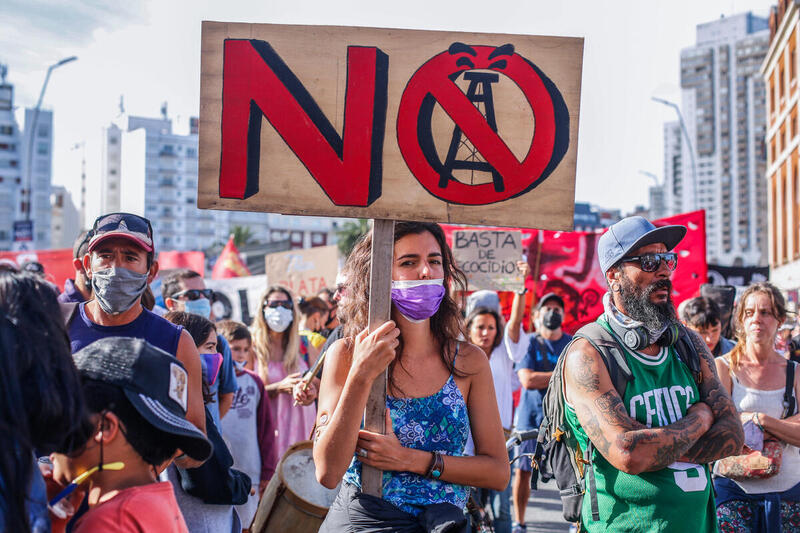Argentina’s political class is promoting fossil fuels as a patriotic national endeavour and demonising any environmentalists who oppose them
Argentina’s national oil company has begun to fill up a key gas pipeline on the country’s national flag day today, rushing to get the project completed on time to present it as a patriotic endeavour.
As the country gears up for election season, all the leading candidates and even some young environmentalists support the building of the Néstor Kirchner pipeline — a key piece of infrastructure that would allow for record gas exports from the Vaca Muerta “carbon bomb”.
Fossil fuels’ opponents have been villified with state-owned oil company YPF hiring a consultancy who advised them to ridicule environmentalists who opposed offshore oil drilling, as well as attaching the project to “nationalistic” views.
Pipeline for a “carbon bomb”
Ten years ago, gas was discovered in the Vaca Muerta shale fields of Argentina’s far west.
Despite this bounty of energy though, Argentina is still shipping in expensive foreign gas, as moving Vaca Muerta’s gas to eastern population centres by truck is prohibitively expensive.
To overcome this, successive governments have tried to build a pipeline from the gas fields to the country’s capital Buenos Aires, to provide energy to its 15 million consumers and to export gas abroad, earning the country much-needed foreign currency.
Hoy, en una jornada histórica, comienza el llenado del Gasoducto Presidente Néstor Kirchner, la obra de ingeniería más importante de los últimos 50 años y un hito trascendental en la gestión del ministro @SergioMassa. pic.twitter.com/0GH0CUm6DU
— Flavia Royon (@FlaviaRoyon) June 20, 2023
The project was held back by economic crisis then pandemic but today a section of it was finally inaugurated.
Argentina secures funding boost to kickstart gas exports from ‘carbon bomb’
Wearing a hard hat near gas workers waving the Argentine flag, energy minister Flavia Royon called the pipeline “the most important engineering work of the last 50 years and a transcendental milestone”
The pipeline is named after former president Néstor Kirchner, deceased husband of the current vice-president Cristina Fernández de Kirchner.
Election campaign
With presidential elections scheduled for October, all the leading candidates support the pipeline.
With unpopular president Alberto Fernández not running for re-election, the most likely candidate from the current ruling faction is economy minister Sergio Massa. He has called the pipeline a “turning point” and was at today’s ceremony.
Cristina Fernandez de Kirchner (left) and Sergio Massa (right). (Photo: Victor Brugge/Wikimedia Commons)
The right-wing opposition’s leading candidates – Horacio Rodríguez Larreta, Patricia Bullrich and Javier Milei – all support the pipeline too.
Support goes further than the political class. Even the Argentinan branch of Greta Thunberg’s Fridays for Future movement is supportive.
Recently, Bruno Rodriguez, a leading figure from Youth for Climate Argentina said that Argentina “must develop” and producing gas “is a step in that direction”.
Asked about this, Thunberg said: “I don’t know these parts of the movement so I can’t speak on behalf of them but our general message – at least in the part of the climate movement I’m in – is that we need to move away from all fossil fuels and all false solutions”.
? #SB58 | Le pregunté a @GretaThunberg cuál es su opinión sobre el hecho de que algunas organizaciones de juventud climática están apoyando la explotación del gas en nombre “del desarrollo” y en nombre de que “es un recurso para la transición”
Su respuesta: pic.twitter.com/63AlY4TjAH
— Tais Gadea Lara (@TaisGadeaLara) June 14, 2023
Martín Álvarez is a researcher at Observatorio Petrolero Sur, based in the city of General Roca, not far from the gas fields.
He told Climate Home that the Buenos Aires-based Youth for Climate has been able to “be interlocutors with real power due to the lack of federalism that exists in the country”.
He said that the strength of the environmental movements lies in different provinces of Argentina “not in the youth of the urban middle class, who never understood what is happening [outside of the big cities]”.
Leaked document
Environmentalists that oppose oil drilling off Argentina’s eastern coast, which the government approved in 2021, face a state campaign to discredit them.
Last June, Extinction Rebellion Argentina leaked a document which proved that YPF hired a consultancy called Eonia to train supporters of the pipeline in government and the oil industry to influence public opinion and build a “social license” for the project.
In a slide labelled “rejection of ridicule”, the manual says that many people join a cause because it is fashionable, a sense of belonging or a desire to be part of something bigger and positive.
“We must turn this fashion into a deep fear of being ridiculous,” the slide says, “tying it with the most insane claims and with the most uncomfortable forms”.
Alongside the text are pictures of Extinction Rebellioin protesters throwing soup and paint over artworks, like a Van Gogh painting in London. The painting was unharmed.
One of its slides is titled “nationalist acceptance” and says the oil drilling should be framed as a way for Argentina to go from energy importer to exporter and “make the dollars that Argenina lacks”.
The first offshore driling is expected to start before the end of the year, with Norwegian firm Equinor given the contract.

Protesters in Mar Del Plata march against offshore oil drilling last January (Photo credit: Diego Izquierdo/Greenpeace)
Álvarez said he had “great concern” because it is the state that is carrying out these policies, as the government has a majority stake in YPF.
Environmentalists face harassment and threats on social media too. With twitter users calling them “traitors to the homeland” and declaring “with the bones of the environmentalists, we will build the foundations of the refineries”.
In Argentina’s 40th year of democracy, Alvarez said, environmentalists should not be marginalised and stigmatised or there will be no progress towards a fairer society.

